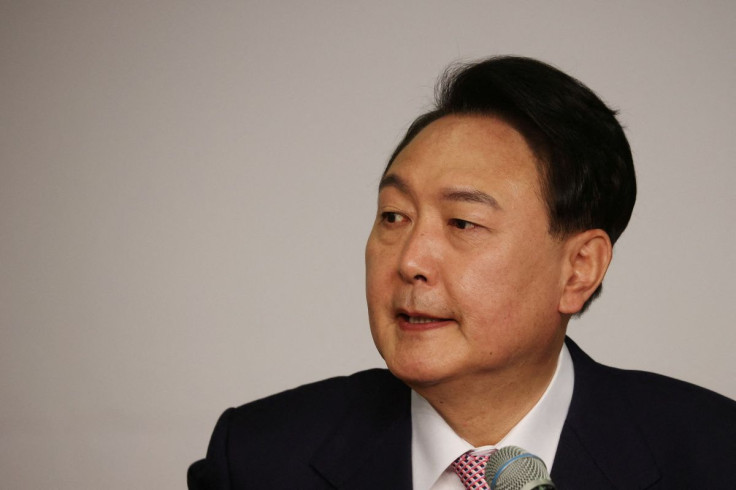Ukraine Crisis Will Prevent President-Elect Yoon To Run S. Korea The Way He Wants

The newly elected President of South Korea, Yoon Suk-yeol, who is set to take the reign of Asia's fourth-largest economy soon, is set to face tough challenges due to economic slowdown because of the Ukraine crisis.
The impacts of the Ukrainian crisis are worrying for the country as wheat and corn imports from the East European nation make up more than 10 percent of the economy.
As imports from Russia and Ukraine dried up both the local food and feed sectors have been negatively impacted and the grain prices have gone through the roof in South Korea, a top ten global economy.
The Ministry of Agriculture, Food and Rural Affairs (MAFRA) recently held a meeting with other ministries, industry associations, financial and agricultural research institutions and experts to implement countermeasures in response to the Russia-Ukraine crisis, MAFRA Minister Kim Hyun-soo said in a statement.
Given the shifting political landscape because of the Ukraine crisis, foreign investors -- who own nearly 40 percent of all shares traded on the benchmark Kospi in early 2020 -- have sought safe havens to park their money.
Foreign investors offloaded stocks worth a net 1.4 trillion won in January and resumed their selling spree from mid-February, according to market experts.
As the Ukraine crisis prompted a sell-off, South Korean shares dropped to less than one-third of the market capitalization.
The won has already weakened to 1,237 against the U.S. dollar, its lowest level since May 29, 2020, when it was 1,238.5.
The western sanctions have spiked global oil, gas, and wheat prices as Russia is the world’s second-largest oil producer and a major exporter of wheat. The surging energy and commodity costs could place downward pressure on the growth path of the South Korean economy
South Korea's central bank has not ruled out the possibility of inflation running high for a longer period due to high energy prices. The country is highly dependent on Russia for its energy needs, including crude oil, and the country imports rare metals from Ukraine.
In a report submitted to the National Assembly, the Bank of Korea (BOK) said that the country's exports growth could slow slightly.
“…we cannot rule out the possibility of inflation staying high for a long period of time due to interaction between income and prices," the report said.
As energy costs spiked, consumer prices grew more than 3 percent for the fifth straight month in February and the BOK has revised up its 2022 inflation growth outlook to 3.1 percent from its earlier estimate of 2 percent.
In February, the BOK froze the benchmark interest rate at 1.25 percent, anticipating a slow economic recovery due to the Ukraine conflict.
Citing the economic fallout from the Ukraine crisis, global rating agency RFitch atings has lowered its 2022 growth outlook for the South Korean economy to 2.7 percent from 3 percent.
"The rise in energy prices related to the Ukraine-Russia conflict will act as a drag on household consumption and business activity," Fitch said in a report on the 2022 global economic outlook.
The downward revision took place as the South Korean economy is facing an upsurge in COVID-19 cases. As the total caseload breached the grim milestone of the 10 million mark, 1 out of 5 South Koreans have been hit by the pandemic.
Earlier, another global rating agency, Moody's Investors Service, lowered its 2022 growth forecast to 2.7 percent from 3 percent.
South Korean trading companies are suffering due to payment delays or withdrawal from trading with Russia. Following global shipping firms’ decision to suspend shipments to Russia, there are also some cases where South Korean cargo ships heading to Ukraine or Russia were forced to offload in third countries.
Eight days after the Russian invasion of Ukraine, the Korea International Trade Association (KITA) reported on March 4 that there were nearly 302 trade-related cases due to the Ukraine crisis. The most frequently reported problem is concerned with payment.
An S. Korean exporter faced difficulties to ship the goods from its Vietnam plant due to the suspension of the Ho Chi Minh-Russia route.
Korean automobile chaebol Hyundai has downed the shutters of its St. Petersburg plant in Russia from March 1 to 5 because of rising raw material costs.
President-elect Yoon who will assume charge in May has made it abundantly clear that South Korea will continue to be a major ally of the U.S. under his stewardship and will follow the U.S. security stance in the Indo-Pacific. Yoon was elected March 9 with the smallest margin in the country's parliamentary history (0.72 percent).
Dumping his predecessor Moon Jae-in’s policy of straddling between the U.S. and China to safeguard the security and economic interests, Yoon prioritizes boosting South Korea’s commitment to the U.S, entering into a military alliance with former colonizer Japan, whom South Koreans still view with suspicion, and conducting preemptive strikes against North Korea’s missile launch sites.
The former prosecutor has already hinted at the additional deployment of THAAD to counter attacks from North Korea and join the Indo-Pacific Economic Framework, a U.S.-led trade grouping that aims at reorienting global supply chains away from China.
However, it is not going to be easy for a new pro-American president to give up on China so easily as Beijing has been South Korea’s largest trading partner for 17 consecutive years, accounting for 25 percent of its total exports in 2021, with a bilateral trade worth a record $362.3 billion, a 27 percent hike from the previous earlier.
With the Ukraine crisis hitting the economy, an inexperienced Yoon will find it hard to lead South Korea the way he wants.
























